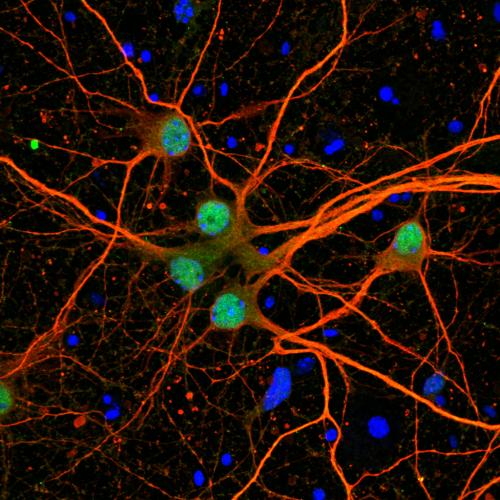
Latest research from Greg Findlay’s lab in the MRC Protein Phosphorylation and Ubiquitylation Unit (MRC PPU) is published today in Developmental Cell. The work discovered a new pathway which is disrupted in people with Intellectual Disability and could provide a new therapeutic strategy for these individuals.
Intellectual Disability is a major developmental disorder that affects an estimated 1-3% of the world’s population. The cause of these devastating conditions in patients is mostly unknown, and in order to treat these we need to understand in molecular detail the cell processes that go awry during development of the nervous system. In the new study, researchers in Greg Findlay’s lab used a stem cell model to uncover a new pathway for cellular communication that is disrupted in intellectual disability patients. This pathway comprises two different types of signalling enzymes; a protein kinase called SRPK and a E3 ubiquitin ligase called RNF12. This pathway controls a protein called REX1 that governs gene expression in stem cells, and regulates a programme of genes that is required for correct development, patterning and functioning of the nervous system. Excitingly, the researchers find that the enzymes in this pathway are disrupted in patients with intellectual disability disorders, providing new insight into the fundamental underpinnings of intellectual disability and identifying new therapeutic strategies to treat these patients.
This research was spearheaded by Dr. Francisco Bustos, a postdoctoral researcher in Findlay lab, with a major contribution from PhD student Anna Segarra-Fas. In addition to an international collaboration with bioinformaticians from Santiago, Chile, this was an excellent Dundee team effort involving many of the core facilities within the MRC PPU and School of Life Sciences at the University of Dundee, including MRC PPU cloning, protein and antibody production and mass-spectrometry, and the Dundee Human Pluripotent Stem Cell Facility. This research was funded by generous support of nearly £600,000 from the Medical Research Council and over £1m from the Wellcome Trust and the Royal Society. The funding awards that supported this research created 3 jobs within the MRC PPU.
Read ‘Functional diversification of SRSF protein kinase to control ubiquitin-dependent neurodevelopmental signalling’ here.

